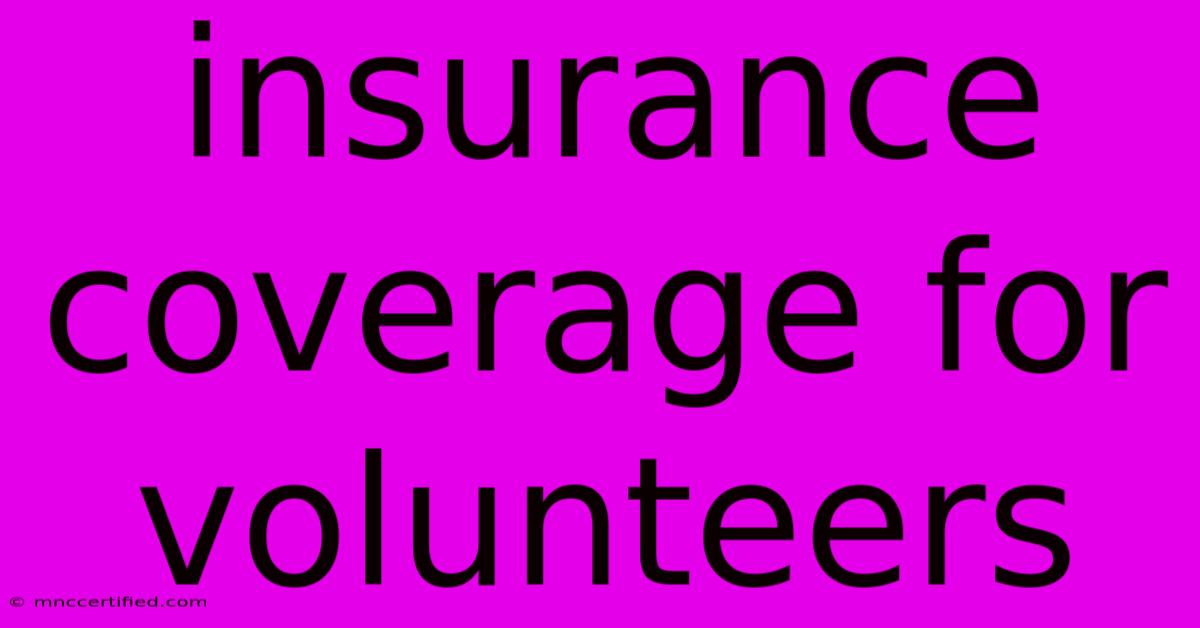Insurance Coverage For Volunteers

Table of Contents
Insurance Coverage for Volunteers: A Comprehensive Guide
Volunteering is a rewarding experience, contributing valuable time and skills to causes you care about. However, it's crucial to understand the potential risks involved and ensure you have adequate insurance coverage. This comprehensive guide explores the different types of insurance that may protect volunteers and clarifies who is responsible for providing it.
Understanding the Risks of Volunteering
While volunteering is generally a positive activity, it exposes individuals to various risks, depending on the nature of the work. These risks can range from minor injuries like slips and falls to more serious incidents such as accidents involving machinery or exposure to hazardous materials. Legal liability is another significant concern; a volunteer could be sued if their actions cause harm to another person or damage to property.
Common Volunteer Risks:
- Accidental Injuries: Trips, falls, cuts, and other injuries are common, especially in physically demanding volunteer roles.
- Exposure to Hazards: Depending on the volunteer position, exposure to chemicals, infectious diseases, or dangerous equipment is possible.
- Liability for Negligence: If a volunteer's actions (or inaction) result in injury or damage, they could face legal repercussions.
- Vehicle Accidents: If using personal transportation for volunteer work, accidents could lead to significant costs.
Who is Responsible for Volunteer Insurance?
Determining who provides insurance coverage for volunteers often depends on the organization and the nature of the volunteer work. It's not a one-size-fits-all answer. Here's a breakdown:
- The Sponsoring Organization: Many organizations, particularly large non-profits and charities, provide liability insurance covering their volunteers for activities performed under their direction. This is often included in their general liability insurance policy. Always check with the organization for their specific insurance policy details.
- The Volunteer's Personal Insurance: Your existing personal insurance policies – such as homeowner's or renter's insurance, and auto insurance – may offer some level of protection. However, the extent of this coverage is highly variable and might not be sufficient for all volunteering activities. Review your policies carefully or contact your insurance provider for clarification.
- Specialized Volunteer Insurance: In some cases, organizations may purchase specific volunteer insurance policies providing broader coverage. This is especially common for high-risk volunteer activities.
Types of Insurance Relevant to Volunteers:
- General Liability Insurance: This covers bodily injury or property damage caused by the volunteer's actions during their volunteer work. This is usually provided by the sponsoring organization.
- Professional Liability Insurance (Errors & Omissions Insurance): This protects volunteers providing professional services, such as medical or legal assistance, from claims of negligence or malpractice.
- Accident Insurance: This covers medical expenses incurred by a volunteer due to an accident during their volunteer work. This might be provided by the organization or be a personal policy.
- Workers' Compensation: In some cases, depending on the nature of the work and the relationship with the organization, workers' compensation might apply, offering coverage for injuries sustained while volunteering. This is generally less common for traditional volunteering roles.
Protecting Yourself as a Volunteer:
- Clarify Insurance Coverage: Before starting any volunteer work, explicitly ask the organization about their insurance coverage for volunteers. Request a copy of the relevant policy documents for review.
- Review Your Personal Policies: Understand your existing homeowner's, renter's, and auto insurance policies. Identify any limitations or exclusions that might apply to your volunteer work.
- Consider Supplemental Insurance: If the organization's coverage is insufficient, consider purchasing supplemental accident or liability insurance.
- Maintain Accurate Records: Keep records of your volunteer work, including dates, locations, and a description of your activities. This is helpful if an incident occurs and insurance claims need to be filed.
Key Takeaways:
Insurance coverage for volunteers is a complex issue with no single solution. The responsibility for providing coverage varies depending on the organization and the specific circumstances. Proactive communication with the sponsoring organization and careful review of personal insurance policies are crucial steps in protecting yourself while volunteering. Don't hesitate to ask questions and seek clarity on insurance matters before embarking on your volunteer journey. Remember, responsible volunteering includes understanding and addressing potential risks.

Thank you for visiting our website wich cover about Insurance Coverage For Volunteers. We hope the information provided has been useful to you. Feel free to contact us if you have any questions or need further assistance. See you next time and dont miss to bookmark.
Featured Posts
-
Renters Insurance West Palm Beach
Nov 19, 2024
-
28 Hour Snow Uk School Closure Updates
Nov 19, 2024
-
Life Insurance Multiple Sclerosis
Nov 19, 2024
-
I M A Celeb Vardy On Wagatha Christie Taunts
Nov 19, 2024
-
Kursk Conflict North Korean Presence
Nov 19, 2024